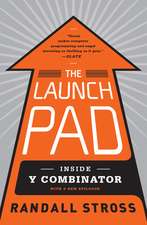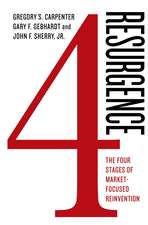The Leadership Hubris Epidemic: Biological Roots and Strategies for Prevention
Editat de Peter Garrarden Limba Engleză Hardback – 18 oct 2017
| Toate formatele și edițiile | Preț | Express |
|---|---|---|
| Paperback (1) | 579.27 lei 38-44 zile | |
| Springer International Publishing – 17 mai 2018 | 579.27 lei 38-44 zile | |
| Hardback (1) | 891.65 lei 6-8 săpt. | |
| Springer International Publishing – 18 oct 2017 | 891.65 lei 6-8 săpt. |
Preț: 891.65 lei
Preț vechi: 1087.38 lei
-18% Nou
Puncte Express: 1337
Preț estimativ în valută:
170.65€ • 177.47$ • 142.80£
170.65€ • 177.47$ • 142.80£
Carte tipărită la comandă
Livrare economică 15-29 martie
Preluare comenzi: 021 569.72.76
Specificații
ISBN-13: 9783319572543
ISBN-10: 3319572547
Pagini: 236
Ilustrații: XXIII, 236 p. 9 illus.
Dimensiuni: 148 x 210 mm
Greutate: 0.46 kg
Ediția:1st ed. 2018
Editura: Springer International Publishing
Colecția Palgrave Macmillan
Locul publicării:Cham, Switzerland
ISBN-10: 3319572547
Pagini: 236
Ilustrații: XXIII, 236 p. 9 illus.
Dimensiuni: 148 x 210 mm
Greutate: 0.46 kg
Ediția:1st ed. 2018
Editura: Springer International Publishing
Colecția Palgrave Macmillan
Locul publicării:Cham, Switzerland
Cuprins
Part I. Biology.- 1. Frontotemporal Dementia: A Clue to the Biological Basis of Hubris Syndrome?; Peter Garrard.- 2. From Molecule to Market; John Coates, Mark Gurnell and Zoltan Sarnyai.- 3. The Winner Effect: The Neuropsychology of Power; Ian H. Robertson.- Part II. Culture.- 4. Management Failure and Derailment; Adrian Furnham.- 5. Toxic Leadership in the Military; John W. Dagless.- 6. Dysfunctional Leadership in Corporations; Dennis Tourish.- Part III. Hygiene and Antidotes.- 7. Heads of Govenrment 'Toe-Holders' and Time Limits; David Owen.- 8. Influential Partnerships: A Possible Role for a Modern-Day Court Jester; Gillian Hyde.- 9. Preventing and Curing Hubris in Leaders; Karen Otazo.
Notă biografică
Peter Garrard is Professor of Neurology at St George’s University of London, and Deputy Director of the Molecular and Clinical Sciences Research Institute, UK. He combines a busy clinical practice with a research programme focusing on language and dementia. He has authored over 100 papers and chapters, and edited three books, including “The Intoxication of Power”, published by Palgrave Macmillan in 2015.
Textul de pe ultima copertă
This edited collection surveys and analyses the multidimensional problem of Hubris syndrome, and its deleterious effect on leadership within organisations. The study develops an extended metaphor of the social and political ill of Hubris as a virulent, communicable disease of dysfunctional leadership, illustrating its ubiquity and potential for serious harm. Taking a biological perspective to understand the possible underlying mechanisms as well as the environments in which hubris has been found to thrive, contributors emphasise the notion of prevention over cure. Divided into three sections, The Leadership Hubris Epidemic examines psychological, neuroendocrinological and neuropsychological approaches to the biology of Hubris, explores factors that encourage or inhibit its growth, and finally provides methods for preventing or retarding its development. This book has huge interdisciplinary appeal and scholars of biology, psychology, sociology, management, and politics will find the topic extremely useful, as well as anyone who is interested in the structure and governance of organisations.
Caracteristici
Explores the effect of hubris on financial decision making Examines the interactions between personality, organizational culture and performance in managerial and leadership roles Discusses the symbiotic relationship of the media and individual hubris Includes supplementary material: sn.pub/extras














